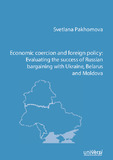Citation link:
http://dx.doi.org/10.25819/ubsi/4551Files in This Item:
| File | Description | Size | Format | |
|---|---|---|---|---|
| Pakhomova_Economic Coercion and foreign policy_2020.pdf | 4.3 MB | Adobe PDF |  View/Open |
| Dokument Type: | Doctoral Thesis | metadata.dc.title: | Economic coercion and foreign policy: Evaluating the success of Russian bargaining with Ukraine, Belarus and Moldova | Other Titles: | Wirtschaftlicher Druck und Außenpolitik: Effektivität des russischen Bargaining mit der Ukraine, Belarus und Moldau. Ein Vergleich | Authors: | Pakhomova, Svetlana | Institute: | Seminar für Sozialwissenschaften | Free keywords: | Russia, foreign policy, economic coercion, bargaining, QCA, Russland, Außenpolitik, wirtschaftliche Druckinstrumente | Dewey Decimal Classification: | 320 Politik | GHBS-Clases: | PDXK PEF |
Issue Date: | 2020 | Publish Date: | 2020 | Abstract: | While the debate on the effectiveness of economic coercion is as long-standing as the reliance on sanctions as a recognised foreign policy tool, less attention has been paid to the particular case of the Russian Federation and its relationship with the neighbouring countries. Given the accumulation of recent incidents of economic diplomacy in the Eurasian region, and in view of the insistent need to refine the pool of possible determinants for effective advancement of Russia’s foreign policy objectives, the following work develops own predictions and verifies them on the cases of Russian bargaining with Ukraine, Belarus and Moldova. Encouraged by the existing scientific gap, this research aims to detect causal pathways leading to favourable outcomes and reveal factors, which help translate bargaining advantage into political capital. Investigation of Russia’s bargaining interactions that took place within 2000 and 2013 not only found support for the limited success of coercive instruments against Kiev, Minsk and Chisinau, but also uncovered economic, regime and issue-specific attributes capable of enhancing Moscow’s ability to achieve its objectives. Im Widerspruch zur umfangreichen Debatte über die Effektivität von Wirtschaftssanktionen zur Erreichung außenpolitischer Ziele steht die Tatsache, dass die Frage nach dem Erfolg Russlands bei der Anwendung wirtschaftlicher Druckinstrumente gegenüber seinen Nachbarstaaten bisher verhältnismäßig wenig wissenschaftliche Aufmerksamkeit gefunden hat. Die folgende Arbeit will einen Beitrag dazu leisten, diese Lücke zu füllen. Das Ziel ist es, die Prozesse der Wirtschaftsdiplomatie in der Eurasischen Region aus der Bargaining-Perspektive zu untersuchen, die Wirksamkeit der russischen Strategie zu bewerten und die Faktoren zu ermitteln, die den Ausgang von Verhandlungen zwischen Russland und Ukraine, Belarus und Moldau im Sinne Moskaus beeinflusst haben. Die Analyse der Verhandlungsprozesse, die zwischen den Parteien im Zeitfenster von 2000 bis 2013 stattgefunden haben, offenbart einerseits einen geringen Erfolg Russischer Druckmittel in Bezug auf die drei Zielländer. Andererseits gibt sie Aufschluss darüber, welche lokalen Gegebenheiten für die Zielerreichung förderlich gewesen sind und welche außenpolitischen Kurskorrekturen für Moskau bessere Ergebnisse hätten herbeiführen können. |
Description: | Aus datenschutzrechtlichen Gründen fehlt in der Onlineversion: Appendix 2 – Interviews |
DOI: | http://dx.doi.org/10.25819/ubsi/4551 | URN: | urn:nbn:de:hbz:467-17018 | URI: | https://dspace.ub.uni-siegen.de/handle/ubsi/1701 | License: | http://creativecommons.org/licenses/by-sa/4.0/ |
| Appears in Collections: | Universi Hochschulschriften |
This item is protected by original copyright |
Page view(s)
811
checked on Dec 1, 2024
Download(s)
370
checked on Dec 1, 2024
Google ScholarTM
Check
Altmetric
This item is licensed under a Creative Commons License


